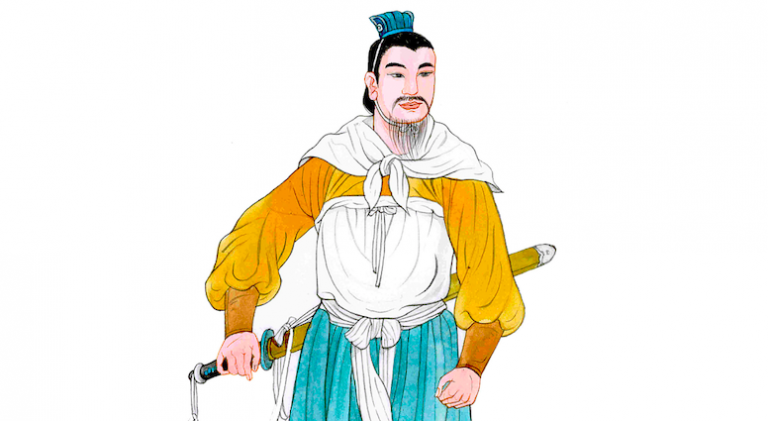China’s Han Dynasty (漢朝), founded in 202 B.C., lasted four centuries and inspired the modern name of the Han people, who make up over 90 percent of China’s 1.4 billion population today. But in many ways, the Han Dynasty’s rise was decided by the heroic achievements and tragic sacrifice of one man.
Han Xin (韓信) was a soldier of an obscure background. Born in eastern China, he was so poor during his youth that he could not afford to have a proper funeral for his mother when she died.
In 221 B.C., China was united by Qin Shi Huang, the First Emperor. After his death, however, the Qin Dynasty fell into corrupt tyranny and rebellions were soon everywhere. Han Xin soon joined the most powerful rebels led by the fearless warrior Xiang Yu — the Overlord of Western Chu.
But Han Xin felt out of place in the Overlord’s army. He had many brilliant strategies, but every time he put forth a suggestion, he was ignored. Soon, he abandoned the Chu forces and joined Liu Bang, a warlord who controlled the territory of Hanzhong.
At first, Han Xin was a nobody in Liu’s army. In fact, he was almost executed for breaking military law. But he was noticed by Liu Bang’s trusted advisor Xiao He and promoted to the rank of marshal.
Success
You are now signed up for our newsletter
Success
Check your email to complete sign up
In 206 B.C., the Qin Dynasty had fallen completely. The war between Xiang Yu’s Western Chu and Liu Bang’s Han empire was beginning.

Han Xin (韓信) was a soldier of an obscure background. Born in eastern China, he was so poor during his youth that he could not afford to have a proper funeral for his mother when she died. (Image: wikimedia / CC0 1.0)
Han Xin in command
The Han forces were a ragtag group holed up in the desolate Hanzhong region, while Overlord Xiang Yu enjoyed not only military strength, but an alliance that covered most of China. To make matters worse, Hanzhong was surrounded by mountains that blocked the path back to the rest of the country.
To advance out of Hanzhong, Han Xin tricked the enemy general into believing that he was repairing a network of precarious gallery roads through the mountains, when in fact his army had gone a longer route via the city of Chencang. “Repairing the gallery roads in the open while advancing via the hidden path of Chencang” (明修棧道,暗渡陳倉) is now a famous Chinese idiom and is included in the 36 Stratagems of ancient Chinese military thought.
Han Xin’s surprise attack through Chencang allowed him to quickly seize 3 of the 18 kingdoms that made up post-Qin China. He continued through the northern kingdoms, singlehandedly conquering seven more territories.
In another famous battle, Han Xin led his men across a river and set up camp with their backs to the riverbank. Even when a much larger army attacked his men, the Han troops fought back ferociously because there was no way out of the struggle. This was the origin of another well-known idiom, “a battle with one’s back to the river” (背水一戰).

Han Xin singlehandedly conquered northern China, securing the victory of the Han Dynasty. (Image: The Epoch Times)
The loyal marshal
After taking over north China from Xiang Yu and his allies, Han Xin’s power was unparalleled. His advisor, Kuai Tong, pointed out that if Han Xin wanted to, he could easily break off from Liu Bang’s forces and begin his own empire.
But Han Xin refused. Liu Bang was the one who picked him out from among all the other common soldiers and made him his top general. For this, Han Xin owed a debt. Betrayal was the furthest thing from his mind.
In 202 B.C., Han Xin and other commanders of the Han Dynasty closed in on Xiang Yu’s remaining forces. Surrounded, the Overlord of Western Chu fought to the last man, before taking his own life on the bank of the Wu River.
With his contributions, Han Xin was a hero. But Liu Bang, who was now emperor, began to distrust his loyal general. He had Han Xin demoted from the rank of King to a lower noble title. In 196 B.C., minister Xiao He conspired with Liu Bang’s evil wife Lü Zhi to set a trap for Han Xin. They captured him and accused him of plotting rebellion, then had him murdered.
Han Xin rose from humble origins to become one of Chinese history’s greatest men. His genius in the art of war supported the rise of the Han Dynasty that ushered in China’s first golden age and had a tremendous influence on generations to come. Today, the Chinese remember Han Xin as the “pillar of the nation.”
Follow us on Twitter or subscribe to our weekly email














